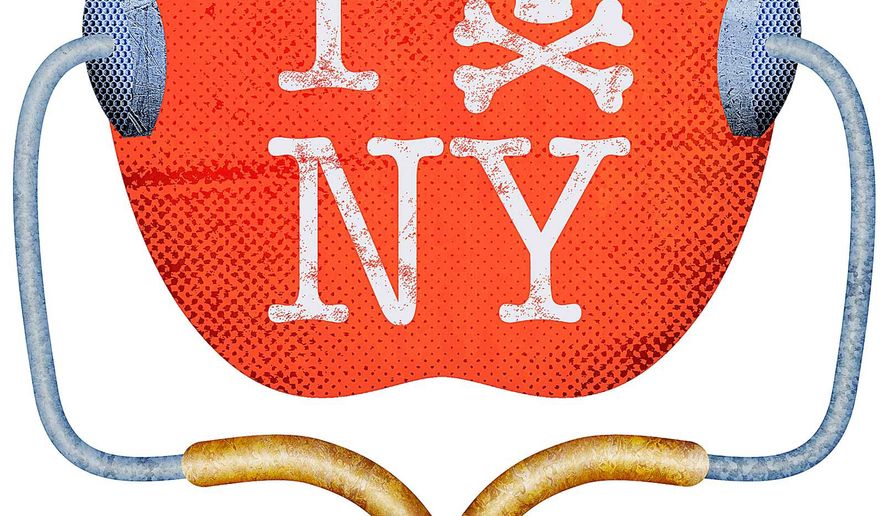OPINION:
Last November, New York Gov. Andrew Cuomo took commendable action to confront an uncomfortable topic and a horrific reality: Suicide, he said, had become a statewide public health crisis. Calling the state’s sudden spike in suicides “unacceptable” (New York now ranks 5th in the nation), he said that awareness and prevention is a top priority for the state.
So imagine my confusion when I heard that the New York Assembly was taking up a bill that would increase the number of suicides in the state (by more than 6 percent, according to Southern Medical Journal) and leave the elderly — whom the governor recognized as a high-risk group — in particular danger.
The bill legalizes assisted suicide — that is, it protects doctors who write prescriptions for lethal poisons — under the guise of supposed compassion. The reality is, it is anything but. And calling it “Medical Aid-in-Dying” does not change that.
Last week, at the invitation of the Assembly’s Committee on Health, I testified in a marathon, 11-hour hearing. In a sea of activists with “My Body. My Choice. My Death.” stickers, there were three significant — and deadly — points about the bill that should give all New Yorkers and those they have elected to represent them great pause.
First, assisted suicide bills create a scale to determine those individuals a state will protect and those who are deemed less valuable. With a yardstick created by well-paid death advocates, doctors will legally determine if a fellow New Yorker fits into the category of “better off dead.”
And while proponents of this bill will tell you the bill addresses intolerable suffering, 20 years of data from Oregon (the “pioneer state” for assisted suicide) tell us that three out of four people who ask their doctors for help committing suicide do so because they feel they have become too great a burden to their loved ones or miss participating in daily activities without assistance.
So, as citizens and policymakers, we are left with this question: If this bill is really meant to help those who feel they are a burden or need help to participate in some activities, why can only those with terminal illnesses access the lethal drugs? Why not the elderly? Or those with a permanent disability? That’s a question death enthusiasts do not want you, me or anyone else to ask.
This death movement requires us to ignore the truth: This bill is designed to wedge us into accepting death as a reasonable solution when life becomes difficult.
The next disturbing fact of this assisted suicide bill is that it does the exact opposite of what it purports to do: It removes a patient’s freedom and choice. In fact, those with limited financial resources and those with disabilities face near abandonment under this bill.
Suppose an insurance company decides that economically it is better for someone to be dead than receiving costly treatment. That’s what happened to Californian Stephanie Packer. A mother of four young children, she wanted to live, but her insurance company said her treatments simply cost too much; for $1.20 co-pay, Stephanie was offered death as an alternative.
Or suppose a disabled person who is nonverbal has a caretaker who purposefully and falsely claims that the individual wants to die, even if he very much wants to live; there is nothing in this bill that would protect him, either.
Finally, consider the reality that assisted suicide bills fail to define what a terminal illness actually is; sure, these bills clarify that a person must, by medical judgment, have six months or less to live. Compare that, though, to the stringent guidelines established by the U.S. National Institutes of Health, which specifies that a terminal diagnosis must include the exhaustion of all conventional treatments.
These bills deceptively allow people with treatable illnesses, such as diabetes, to discontinue lifesaving treatment, such as insulin, and become eligible for lethal poison by way of prescription.
We at the American Conservative Union Foundation believe that dignity resides in the individual and is innate our humanness. Worthy of all of America’s liberties and protections enumerated in our Constitution, each one of us deserves to live free of any present or future suggestion that our life has become less valuable simply because our circumstances and abilities have changed.
Assisted suicide bills across our nation, including this recent one in New York, create a two-class system by which some of us retain these liberties and others of us surrender them.
• Julie Hocker is a senior policy fellow for the Center for Human Dignity at the American Conservative Union Foundation.




Please read our comment policy before commenting.